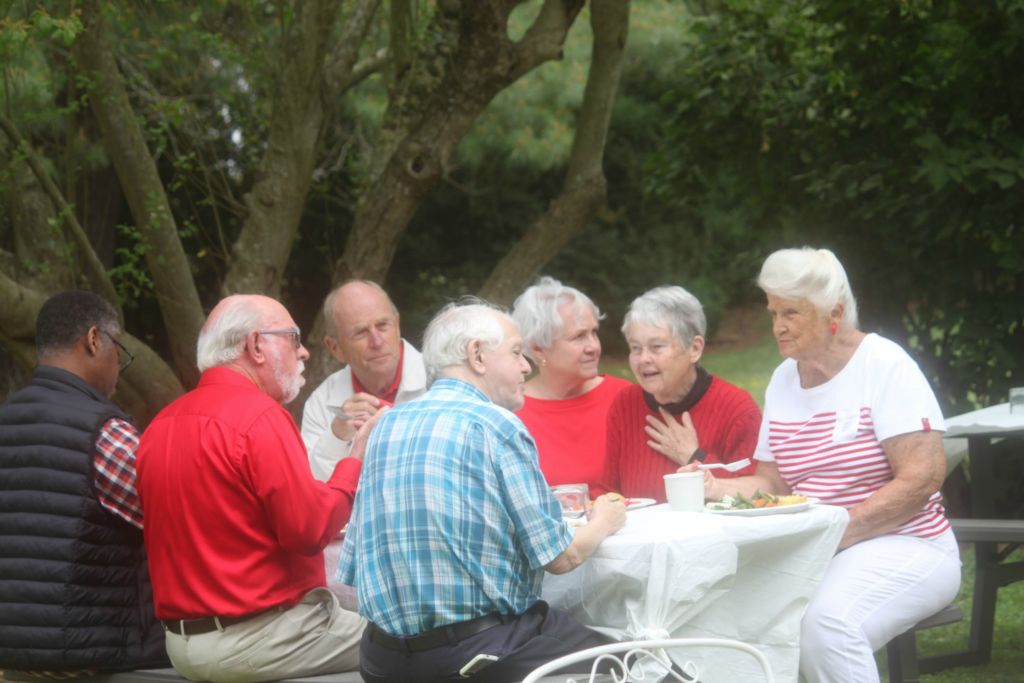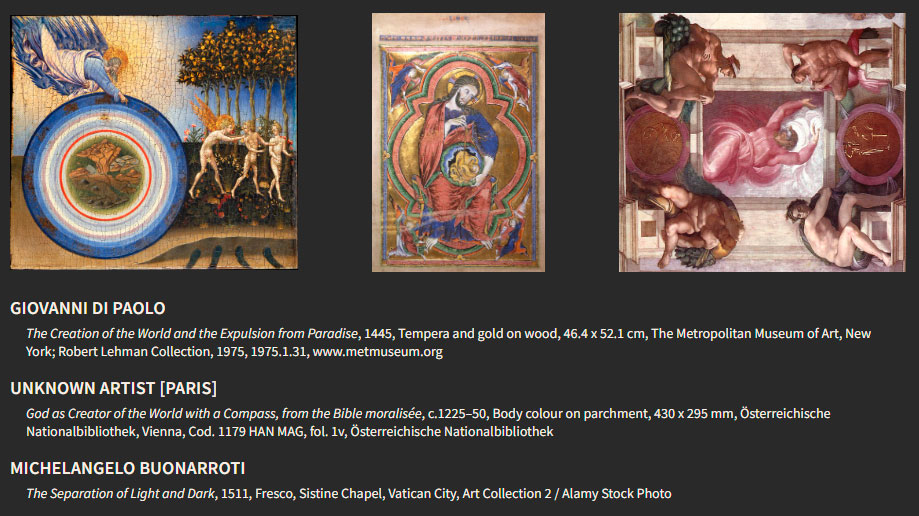Click here to view in a new window.
2023 Sun June 4
Recent Articles, May 31, 2023
1. Projects
New Picnic Tables
UTO Collection June 4
Jamaica Project, 2023, due June 17
2. Trinity Sunday, June 4
Trinity Sunday
Lectionary for Trinity Sunday
Vanderbilt Visual Commentary
Visual Commentary on Genesis 1
Introduction to the Trinity
Visualizing the Trinity
Nicene Creed – line by line
Hymn of the Week – Holy, Holy, Holy
Celebrating the Rappahannock on Trinity Sunday
Sunday links, Trinity Sunday, June 4, 2023

A wild Pentecost – Holy Spirit, Bluegrass and Preaching
Visual Lectionary Vanderbilt – Trinity Sunday June 4, 2023
Click here to view in a new window.
Lectionary Trinity Sunday, year A
I.Theme – Creation and Trinity meet in Worship

"The Trinity" – Hermano Leon
The lectionary readings are here or individually:
Old Testament – Genesis 1:1-2:4a
Psalm – Psalm 8 Page 592, BCP
Epistle –2 Corinthians 13:11-13
Gospel – Matthew 28:16-20
The week is seemingly about beginnings and end – creation in the Old Testament and the Trinity in the New Testament. The Epistle and Gospel are the concluding verses in the 2nd Corinthians and Matthew.
The key concept that bring creation and Trinity is worship. The Gospel emphasis is on the disciples worshipping the risen Lord and spreading His teachings. The creation stories describe God worthy of worship.
Furthermore this is for us a time of transition as we move into Ordinary Time. Our liturgical calendar is top-heavy in that all of the major seasons and holy days of the church happen in the first half of the church year which begins on the first Sunday of Advent. The second half of the year is rather quiet. It is a time to go deeper into the life of Jesus and the great stories of the Old Testament
Both of the Old Testament readings for this day look at the work of the Creator, in the first account of Creation found in Genesis, and more specifically at the creation of humankind in Psalm 8, our purpose and our role. Both Psalm 8 and Genesis 1 explain the role of humanity to have dominion over the creatures of the earth, and both suggest that this dominion is given by the same God who has dominion over us. The understanding of stewardship and care is explicit in this understanding of having dominion.
Both of these passages also suggest that God is in relationship in a divine sense. In Genesis, God says, “Let us make humankind in our image.” In Psalm 8:5, the psalmist sings, “Yet you have made them [human beings] a little lower than God.”
As God is in relationship with us, we are created in the image of God: in the image of relationship. We were created to be in relationship with one another because this is the image of the Divine: God is in relationship. Jesus made this clear, especially in John’s Gospel, in referring to God as “Abba, Father.”
We know that breath, wind and spirit are the same words in Hebrew as in the Greek–we have experienced the wind from God that swept over the waters in the second verse of the Bible as the Holy Spirit, moving through the house on the day of Pentecost in Acts 2 like the rush of a violent wind, breathing on the disciples from Jesus the night after his resurrection in John 20.
The concept of the Trinity is hard to find in the Bible. The two New Testament passages this week are among the very few that mention all three: God the Creator (Father/Mother of us all), Christ the Son (Savior, Redeemer and Messiah), and the Holy Spirit (or Holy Ghost). The Trinity as a doctrine came later in the life of the church, as did most of our doctrines and core theological beliefs.
For Trinity Sunday, we recognize and celebrate the mystery of God’s relationship with God’s self, and the mystery of our own relationship with God, created a little lower than God/Angels/Divine Beings and recognize our relationship with God, all of humanity, and creation as shared in Genesis 1 and Psalm 8. And we recognize our own calling by this Triune God through the person of Jesus Christ in our commission to the world in Matthew 28.
Some of us have our doubts, even about the mystery of the Trinity, but we all are called by the same Jesus to “Go therefore and make disciples of all nations, baptizing them in the name of the Father and of the Son and of the Holy Spirit.” This is our call–to make disciples in the names of all Three in One. Holy, holy, holy. God in Three Persons, blessed Trinity. We are comforted by Jesus last remark “And remember, I am with you always, to the end of the age."
On this Father’s Day, we celebrate the Trinity, and we also can celebrate the relationship Jesus had with God, one in which Jesus called God Abba, Father.
New Picnic Tables
4 new picnic tables to replace the rotting, wooden tables were blessed during Pentecost and used for the first time during the picnic. They were easier to enter without climbing over the boards.
From the bulletin on May 28, 2023 – “Thank you, Ken and Andrea Pogue, and Larry Saylor for picking up our new picnic tables, and to Ken for assembling them. Thank you for those who donated the money for these new tables. We will bless the tables today at the picnic.”

Visual Commentary on Scripture – In the Beginning, Genesis 1
Genesis 1:1–2
Revised Standard Version
1 In the beginning God created the heavens and the earth. 2 The earth was without form and void, and darkness was upon the face of the deep; and the Spirit of God was moving over the face of the waters.
This exhibition contains works of art by Giovanni di Paolo, Unknown artist [Paris], and Michelangelo Buonarroti.

Go to The Gallery
Back to Jamaica in 2023

In 2021, St. Peter’s fundraising contributed $3,000 for the school project. Here is the presentation from that trip.
A mission trip was organized to setup the school distribution. The supplies were sent ahead of the distribution.
In 2023 we are refreshing the supplies as well as moving to supply additional items, like computers. This year only Andrea, Ken and Laura will be going to deliver the supplies.
Background
Victoria Primary School, formerly Victoria All-Age is located in North West St. Catherine about two (2) miles from the major town of Linstead in the farming community of Victoria. Victoria, along with the adjoining community of Banbury, where most of the children are from, has a populace of over 20,000.
Approximately 10 % of the adult population is dependent on farming for a living, some of the produce from this activity is sold at the Linstead Market and the remainder kept for domestic use. Another 30% depends on vending as their main means of livelihood, 40% is employed while the remaining 20% is unemployed.
The current parent population is very young with the average age being about 25 years. Most of them have attained secondary level of education but have not moved on to tertiary learning but instead have acquired a skill in order to become employable.
The school was originally a shift school, an elementary. It was built to house about 200 children. At the time of the 2021 mission trip school population it was 330
At the beginning of each school year, some parents often have financial challenges in purchasing items to send their children back to school. Some of these include the purchasing of school bags, writing books, pencils and uniforms etc. There are times when past students will assist in purchasing some of these items.
UTO Spring Ingathering to be collected May 28 at Pentecost

The United Thank Offering (UTO) is a ministry of The Episcopal Church for the mission of the whole church. Originally it was started in the 1880’s to support missionary work. Through UTO, individuals are invited to embrace and deepen a personal daily spiritual discipline of gratitude. UTO encourages people to notice the good things that happen each day, give thanks to God for those blessings and make an offering for each blessing using a UTO Blue Box. UTO is entrusted to receive the offerings, and to distribute the 100% of what is collected to support innovative mission and ministry throughout The Episcopal Church and Provinces of the Anglican Communion.
Here is a recent video on the UTO
